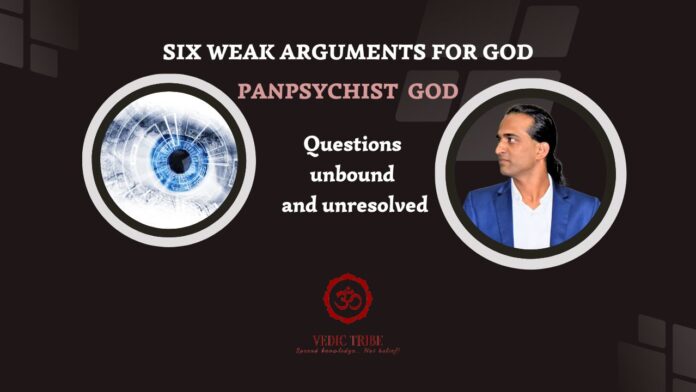Panpsychism: Mind in All Matter
In the previous article, we discussed the fifth weak argument for God – “Spinoza’s God” and in this article, we will discuss the weak argument – “Panpsychist God”.
Panpsychism is the philosophical view that consciousness is a fundamental property of the universe, inherent in all matter.
If our bodies, composed of matter, possess consciousness (mind), then panpsychism suggests that all matter, from the smallest subatomic particles to the largest celestial bodies, possesses some form of consciousness or proto-consciousness.
Not the God but consciousness:
Importantly, panpsychism does not necessarily imply a single, overarching consciousness or a “God” in the traditional sense. It suggests a distributed consciousness, a kind of universal consciousness diffused throughout all matter.
Panpsychism shares some similarities with pantheism, which views God as immanent in all of nature. However, pantheism often emphasizes a single, unified divine substance, while panpsychism suggests a more distributed and perhaps less unified form of consciousness.
Interpretation by contemporary theists:
Some contemporary theistic philosophers, consider that panpsychism suggest the existence of “God”.
Immanence: Panpsychism supports the idea of God’s immanence within creation. If consciousness is inherent in all matter, then God, as the source of all being, is intimately present and active within every aspect of the universe. This challenges traditional conceptions of God as solely transcendent, existing outside of and separate from creation.
God as the Ground of Being: Panpsychism can be seen as aligning with the idea of God as the Ground of Being, the source and sustainer of all existence. If consciousness is fundamental to reality, then God, as the ultimate source, could be understood as the ground of all consciousness.
Animism: Some theological interpretations have drawn parallels between panpsychism and animism, the belief that spirits inhabit all natural objects. However, panpsychism generally avoids supernatural or spiritual explanations.
Challenges to Panpsychism:
The “Unity of Consciousness” Problem: If our minds arise from the interaction of countless microscopic “minds” within our bodies, how do we experience a unified consciousness? This question is largely unanswered by the panpsychist philosophers.
Defining “Experience”: Panpsychism often relies on the concept of “experience” in all matter. However, defining “experience” for subatomic particles or inanimate objects is extremely challenging and may not be a meaningful concept.
Lack of Empirical Evidence: There is currently no scientific evidence to directly support panpsychism.
The Vedic Perspective:
In Vedic wisdom, the interplay between matter (Prakriti) and consciousness (Purusha) is central to the understanding of creation, destruction, and the cyclical nature of existence.
Distinct Entities: Vedic philosophy, the material world is not conscious rather a super consciousness pervades the material world. There is a clear differentiation between the material world and the super consciousness. Prakriti is inert, while Purusha is pure consciousness. Further Patanjali’s “Vishesha Purusha” (the almighty) clearly draws distinct from other individual consciousness.
Dependence: The material world does not have any independence. Only when consciousness interacts with it, the apparent movement of the world is caused. The world does not move consciously, rather a separate conscious entity moves it. Individual consciousness though has limited independence, it is dependent on cosmic consciousness. On the other hand, the cosmic consciousness is the only truly independent entity.
Conclusion:
Panpsychism is a fascinating but challenging philosophical concept. While it offers intriguing possibilities for understanding the nature of consciousness and the universe, it also raises profound questions that remain largely unanswered.
Vedic wisdom on the other hand offers a simple three-entity proposition and paves the way for deep introspection into the nature of interaction between these three entities.
Vedic Tribe is happy to have brought you this series, where selected six contemporary arguments for God are made in the modern theistic tradition.
We aim to provide a holistic approach to spiritual growth, emphasizing the importance of both intellectual inquiry and inner exploration. We aim to cultivate curiosity and a thirst for knowledge in you, while reminding you that the ultimate truth lies beyond the realm of pure logic and reason.
All the best.
Madhwesh K
Vedic Tribe

